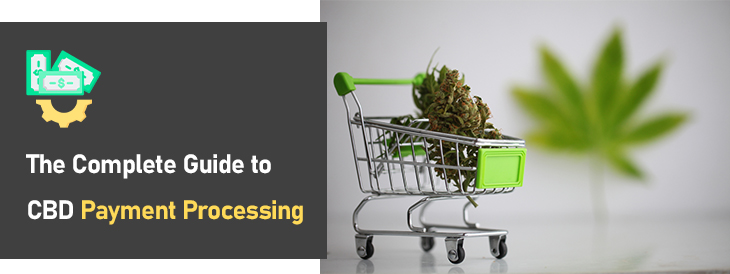The Complete Guide to CBD Payment Processing
The Complete Guide to CBD Payment Processing

In recent years, CBD has become a popular alternative for those seeking relief from a variety of health issues. As the industry continues to grow, it’s important for businesses to have a reliable and secure way to process payments for these products.
This is where CBD payment processing comes in. With the ever-changing laws and regulations surrounding CBD, finding a payment processor that understands the unique needs of the industry can be a challenge. In this complete guide, we’ll dive into everything you need to know about CBD payment processing, including its benefits, challenges, and the best practices for ensuring a smooth and successful payment process.
Whether you’re a CBD business owner or a consumer, this guide will provide you with the necessary information to navigate the world of CBD payment processing.
Understanding the Challenges of CBD Payment Processing
Navigating the complexities of CBD payment processing can be a daunting task for many businesses in the industry. The primary challenge lies in the fact that despite the legalization of hemp-derived CBD products at the federal level in the United States, there is still a significant amount of ambiguity and variability in state laws and regulations.
This legal grey area makes traditional financial institutions and payment processors wary of servicing CBD companies, fearing potential legal repercussions or loss of federal licensing.
Moreover, the high chargeback rates commonly associated with online CBD sales add another layer of risk for payment processors. These rates are often due to customer dissatisfaction or confusion regarding the efficacy and use of CBD products. As a result, many payment processors categorize CBD businesses as high-risk, which can lead to higher fees, more stringent contract terms, or outright denial of service.
Another hurdle for CBD businesses is the constant evolution of regulations surrounding the sale and marketing of CBD products. Staying compliant requires continuous monitoring and adaptation, which can be resource-intensive for both merchants and their payment processing partners.
These challenges underscore the importance of choosing a payment processor that not only specializes in high-risk industries but also has a deep understanding of the CBD market and its specific regulatory landscape.
Some Related Blogs
- Choose The Right Merchant Account For Your Telecom Business
- Navigating The Benefits Of A Pawn Shop Merchant Account
- The Beginner’s Guide To E-cigarette Merchant Accounts
- Merchant Account For Peptides: Pros, Cons And Alternatives
The Legal Landscape of CBD Payment Processing
The legal landscape of CBD payment processing is intricately tied to the broader regulatory environment governing the sale and distribution of CBD products. At the federal level, the 2018 Farm Bill legalized hemp-derived CBD products containing less than 0.3% THC, effectively differentiating them from marijuana under the Controlled Substances Act.
This landmark legislation paved the way for a surge in the CBD market, yet did not fully clarify the regulatory obligations for payment processors and financial institutions.
Despite federal legality, the state-by-state patchwork of laws concerning CBD creates a complex operational environment for businesses and payment processors alike. Some states have fully embraced the CBD industry, implementing regulations that encourage growth, while others have imposed strict restrictions or outright bans on the sale of CBD products. This disparity complicates the ability of payment processors to offer uniform services to CBD businesses across the country.
Moreover, federal agencies such as the Food and Drug Administration (FDA) have yet to issue comprehensive guidelines on the marketing and labeling of CBD products, leaving payment processors to navigate uncertain waters when assessing the risk of servicing CBD clients. The absence of clear federal guidelines coupled with the varied state regulations underscores the need for payment processors to be highly adaptable and well-versed in the legal nuances of the CBD industry.
Finding the Right Payment Processing Partner
Finding the right payment processing partner for your CBD business involves careful consideration of several key factors. First, look for processors that have a proven track record of working with high-risk industries, particularly those with experience in the CBD sector.
Such companies will be more equipped to handle the unique challenges and regulatory complexities associated with your products. Next, transparency is critical. Ensure that the payment processor is upfront about their fees, contract terms, and any other potential costs or obligations.
This clarity will help you avoid any unexpected expenses or stringent conditions that could hinder your business operations.
Additionally, evaluate the level of customer support provided.
Given the dynamic regulatory environment of the CBD industry, having access to knowledgeable and responsive customer service can be invaluable, especially when navigating compliance or addressing transaction issues. Also, consider the technology and security measures the processor uses. Your payment processing partner should offer robust fraud protection and secure payment gateways to protect both your business and your customers’ data.
Lastly, seek out payment processors that offer flexibility in payment methods, allowing you to cater to a broader customer base and adapt to changing consumer preferences. By prioritizing these aspects in your search, you can establish a partnership that not only supports your current needs but also fosters long-term growth and compliance in the evolving CBD market.
Alternative Payment Solutions for CBD Businesses
In response to the challenges faced with traditional CBD payment processing, many CBD businesses are turning to alternative payment solutions to mitigate risks and cater to their customer base effectively. Among these options, cryptocurrency stands out as a prominent choice due to its decentralized nature, offering a level of anonymity and security appealing to both merchants and consumers.
Platforms such as Bitcoin and Ethereum provide a way to bypass traditional banking restrictions, though they require a customer base that is comfortable with digital currencies.
Another growing trend is the use of e-wallets and mobile payment systems like PayPal, Venmo, and Square. These platforms have begun to adjust their policies to accommodate CBD businesses under specific conditions, emphasizing the importance of compliance with local laws and regulations. E-wallets offer the benefit of convenient, fast transactions, which can enhance the customer shopping experience.
Additionally, some CBD businesses are exploring direct bank transfers, ACH payments, and even establishing merchant accounts with banks overseas where regulations may be more favorable. While these methods may involve more complexity and due diligence, they represent viable alternatives for CBD businesses seeking stability and growth in a fluctuating regulatory environment.
![]()
Email us anytime!
Email customer service 24/7 at info@binarygateways.com
![]()
Call us anytime!
Reach customer care 24/7 at (801) 761-5001
